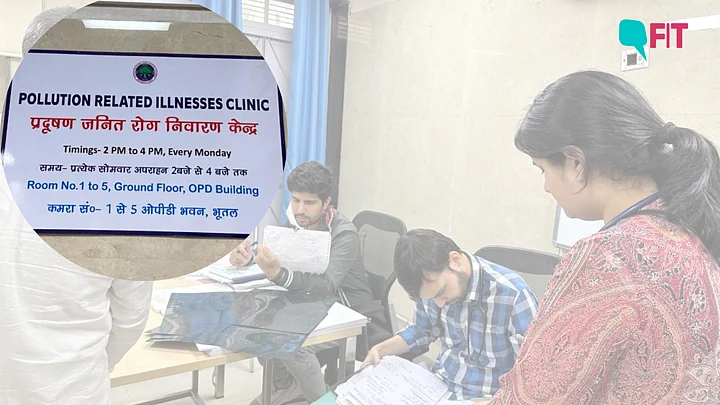As Delhi-NCR’s air quality plummets each day with increasing air pollution, the Centre-run Dr Ram Manohar Lohia Hospital has started a ‘Pollution-Related Illness Clinic’.
This weekly clinic, running since the past four weeks, is organised every Monday from 2-4 pm in the hospital’s Out-Patient Department (OPD) building.
It is “aimed to provide a one-stop solution to all pollution-related illnesses – to address, provide relief, and to educate people about the effects of pollution,” Dr Amit Jindal, Consultant, Department of Respiratory Medicine, tells FIT.
But even as multiple doctors, across five departments, sit with their stethoscope, masks, and information flyers – prepared to help patients out, there are hardly any patients to be seen.
Could it be because people aren’t aware that the hospital is running this clinic? Or could it be that people aren’t aware just how much pollution affects their health?
FIT visited the clinic on 20 November to speak to the doctors behind this initiative.
‘First Clinic Of Its Kind in India’
RML’s pollution clinic is the first of its kind in the country, Dr Desh Deepak, Senior Consultant, Department of Respiratory Medicine, says.
But why did there emerge a need to have an OPD specifically to cater to pollution-related illnesses? For most days in November, the AQI in the region has been between ‘very poor’ and ‘severe’.
On 21 November, the AQI stands at 323 in the ‘very poor’ category, according to the System of Air Quality and Weather Forecasting And Research (SAFAR).
Dr Jindal tells FIT, “Pollution has hazardous effects on our health, especially our respiratory system. But it also affects our eyes, throat, skin, mental health, etc.”
This is also why the hospital has opted for a multidisciplinary approach to the clinic. Headed by the respiratory medicine department, the clinic also has an ENT specialist, a dermatologist, an ophthalmologist, and a doctor from the psychiatry department.
Could pollution really affect your mental health too?
Dr Sana Rose, Senior Resident, Department of Psychiatry, explains:
“Pollution affects cognitive impairment and increases the risk of dementia. Breathlessness might also lead to anxiety or panic disorders, or worsen it in those who already have anxiety disorders. Anticipatory panic attacks might also increase because of respiratory illnesses.”
But Patients Are Hardly Coming In
But not as many patients are coming in as the doctors expected. Dr Rose tells FIT that she hasn’t handled a single patient yet who came for the pollution clinic.
Dr Jindal nods in agreement. He says, “We have a respiratory OPD twice a week where we see about 200-300 patients and a lot of them have health issues due to pollution. But for this clinic, hardly 4-5 patients have turned up each week.”
The patients who do come in are young people, immunocompromised people, or people whose respiratory issues have exacerbated due to the pollution.
The patients that did come complained of:
Cough
Itching in the throat
Runny nose
Watery eyes
Redness in eyes
Difficulty breathing
Dr Jindal says, “We are hoping more people come because a lot of vulnerable populations are at increased health risk and we sincerely want to help them.”
The clinic will be continued till the end of winter, or till Delhi has a “good enough” AQI, the doctors say.
(At The Quint, we question everything. Play an active role in shaping our journalism by becoming a member today.)
